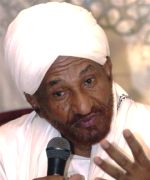Sudanese opposition describes Darfur deal as flawed
May 6, 2006 (KHARTOUM) — The Sudanese opposition parties described the peace deal signed in the Nigerian capital, Abuja, by the government and the main rebel faction in Darfur as flawed and would not end up in establishing comprehensive peace in the region.
 Abdullah Hasan Ahmad, Deputy Secretary General of the opposition Popular Conference of Hassan al-Turabi said in a statement here that the deal signed by the government and main faction of the Sudan Liberation Movement (SLM), of Minna Minnawi, represents a step on the peace track, and urged the government to make more efforts for signing another deal that satisfies the other parties to the conflict.
Abdullah Hasan Ahmad, Deputy Secretary General of the opposition Popular Conference of Hassan al-Turabi said in a statement here that the deal signed by the government and main faction of the Sudan Liberation Movement (SLM), of Minna Minnawi, represents a step on the peace track, and urged the government to make more efforts for signing another deal that satisfies the other parties to the conflict.
Umma Party Secretary General Al-Sadiq al-Mahdi said the Abuja deal “hinges on temptations” after failure of reaching agreement with the armed groups in Abuja noting that this deal should be discussed on a Darfur-to-Darfur negotiation table.
UN special envoy to Sudan Yan Pronk said the Abuja agreement is full but urged the other insurgent groups to sign as well. This came after it was announced that a deal was signed in Abuja, Nigeria, by representatives of Khartoum and the main faction of the Sudanese Liberation Movement (SLM), in the presence of the host Nigerian President Olusegun Obasanjo and the African Union mediators.
However the other Darfur rebel group, the Justice and Equality Movement (JEM), and a smaller faction of the divided SLM refused to sign, saying they would not accept the United Nations-sponsored deal.
US Deputy Secretary of State Robert Zoellick and British Development Secretary Hilary Benn, had arrived in Abuja warning that failure to reach an agreement could also worsen the fragile humanitarian situation in Sudan.
War raged since early 2003 in the Darfur region, a poverty-stricken desert area the size of France. According to estimates as many as 300,000 civilians have died of disease, hunger and militia attacks and 2.4 million people turned homeless.
The accord offers a referendum in the arid desert region, and obliges the government to disarm and neutralize the Janjaweed by mid-October 2006.
It also provides for the rebel movements to be represented in the Sudanese government, and creates a fund for the reconstruction of Darfur.
(KUNA/ST)
